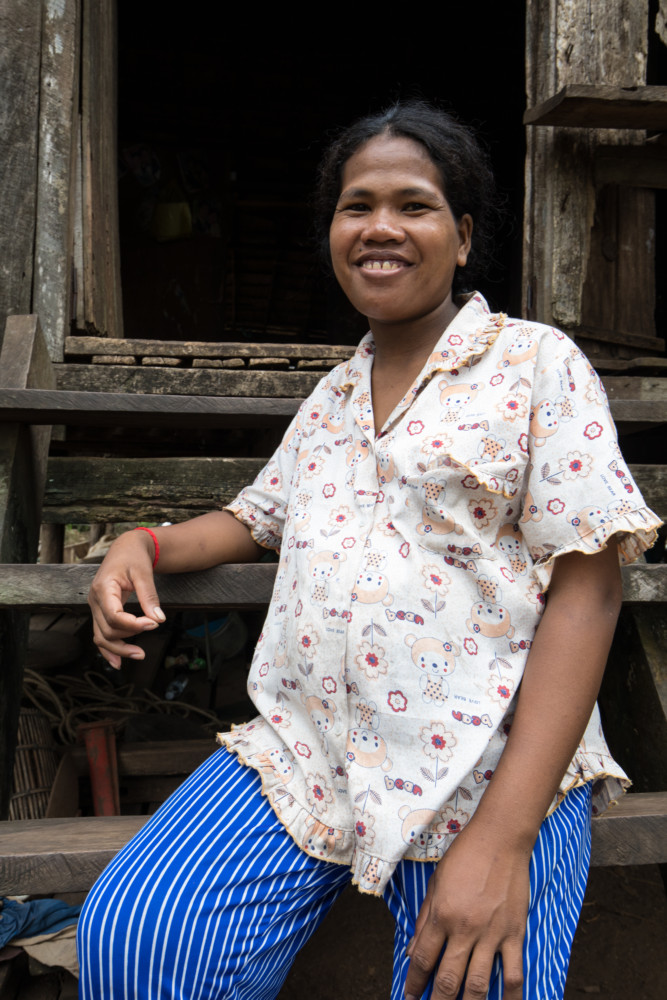Simple Changes, Big Results

“I was born here in this village. This is my home.”
Heng grew up in a small and remote Cambodian village, making access to goods and services difficult. Like many other villages in Cambodia, Heng’s lacked access to proper health care, clean water, and quality education. A trip into town for supplies or to the doctor would require a 25-kilometre hike on rough roads. If someone were sick or pregnant, this would make the travel especially difficult. Though Heng knew there wasn’t much in her village, she still called it home.
As a young girl, Heng began attending school. She walked a long distance to reach the schoolhouse. Unfortunately, she had a difficult time understanding the lessons. She dropped out when she was in grade two before learning how to read.
When she was able, Heng became a day labourer. She worked for different farmers in their fields. One day, she met a man named Sear working in the same field. Their interest in one another grew. Now Heng and Sear are married and have started their own family.
Sear continues to work for other farmers in their cassava fields, usually earning $5 (USD) per day. Heng and Sear do their best to provide for their children. But $5 a day was not always enough.
When ADRA arrived in their village, two workers visited each home to announce new training groups that focused on helping mothers and young children. As Heng had a young child, she decided to join.
It has been two years since the project began and Heng is happy to be involved.
“It has been good!” she says. “We have been learning a lot.”
Through the ADRA project, Heng takes part in a small women’s group called a reflect circle. In this group a local facilitator guides them through important lessons. They discuss various topics such as health and nutrition, including training on planting a kitchen garden. They also learn about sanitation.
“The program has supported us with benefits like seeds, a water filter, and help with a latrine for our family.”
“From the seeds that ADRA gave us I have been growing morning glory [a type of spinach], long beans, cucumbers, and squash.
“We are now using the water filter that we got from ADRA. We used to get sick with diarrhea all the time. Now, we never get sick like that anymore.
“Before ADRA helped us build a nice, new toilet right by our house, we had to go out in the field. It didn’t matter if it was day or night, clear or raining, when you had to go, you had to make your way out into the bush. Having a latrine has been very special for us. It’s easy now … the toilet makes life so much better for our whole family!
Part of Heng’s training covered proper nutrition for pregnant women. It also stressed the importance of pre-natal check-ups.
“I am pregnant now again, and I am now putting into practice the things that ADRA taught us about the diet that pregnant women should follow. Now that I am eating for two, I am eating more, and eating healthy, with a lot of fruit and greens with my meals. I am going into the clinic every month to have the nurse do a check-up on the baby.”
Heng has also learned how to be a better parent. She understands her child’s development and his needs as he grows. The project promotes child learning through play. Heng’s son participates in a children’s group and is learning letters, numbers, and songs about good health practices.
Heng’s group discusses gender roles and communication skills to improve the relationship between husbands and wives.
“In our group meeting we talked about how the husband and wife can share household tasks. Since we started doing that at our home, it has really helped to build our relationship. We are much closer now.
“I would like to say thank you to ADRA, the donors, and the supporters for the help that they have given to our family. The toilet, the water filter, and the training have all been very helpful for us.”
Let's make a difference together!
Related News and Stories
- News Releases, Stories
- News Releases
- News Releases, Stories
- News Releases, Stories